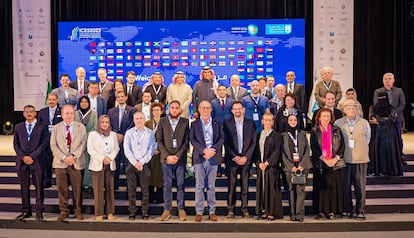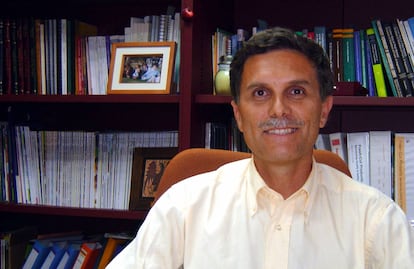Spanish national research council investigates five scientists for manipulating university rankings
The academics were allegedly paid up to €70,000 a year for falsely stating that they worked for Saudi institutions

More than six months after EL PAÍS uncovered a Saudi scheme to fraudulently pump up university rankings, sources in Spain’s Ministry of Science confirmed that the largest public institution dedicated to research in Spain has initiated disciplinary proceedings against five academics allegedly involved in the ruse. Several Saudi universities allegedly paid up to €70,000 ($75,000) per year to foreign scientists to falsely declare that their main workplaces were in Saudi Arabia. This helped the Saudi institutions artificially boost their standing in global academic ratings like the prestigious Shanghai Ranking.
According to the Spanish National Research Council (CSIC), only five of its registered academics may have submitted false information to the Clarivate database of the most-cited scientists in the world. The CSIC spokesperson stressed the “presumption of innocence” regarding its five investigations. One is Damià Barceló, who incorrectly stated his primary affiliation as the King Saud University from 2016-2022, while he served as director of the Catalan Institute for Water Research (ICRA) in Girona, Spain. Another ICRA researcher, Mira Petrovic, said she declined a €70,000 offer from King Saud University in 2019, in exchange for listing her primary affiliation as King Saud University in the Clarivate database used by the Shanghai Ranking. Dutch scientist Jan Willem van Groenigen says he rejected a similar proposal. Barceló denies having received payment over the seven years when he listed a false primary affiliation in the Clarivate database.
When Rafael Luque, a chemistry professor employed by the University of Córdoba, falsely declared that his main workplace was King Saud University from 2019-2022, his employer plummeted 150 positions in the Shanghai Ranking, according to the SIRIS consulting firm in Barcelona. In December 2022, the University of Córdoba suspended Luque without pay for 13 years. Damià Barceló is also currently under investigation by Catolonia’s Anti-Fraud Office, said sources familiar with the case. However, Barceló is still ICRA’s director, despite demands for his suspension by the center’s 14 principal scientists.
The Shanghai Ranking is the most widely recognized and influential ranking of universities. Jiao Tong University in Shanghai assesses academic institutions based on factors like the number of Nobel laureates on staff and professors listed in Clarivate’s Highly Cited Researchers database. Every year, representatives of Saudi universities contact foreign researchers on this list, offering financial incentives to falsely claim affiliations in Clarivate. It appears to be the sole database used for this fraudulent activity.
In 2020, Francisco Tomás Barberán, a researcher and former director of CSIC’s Segura Center for Soil Science and Applied Biology, modified his profile in the Clarivate database to indicate that his primary workplace was the University of Taif (near Mecca) instead of his actual employer in Murcia, Spain. Barberán is a food technologist specializing in intestinal microbes who currently heads agricultural and agri-food research at an agency within the Spanish Ministry of Science.

From 2020-2022, CSIC physicist Andrés Castellanos claimed his primary affiliation as the King Saud University, despite working at the Institute of Material Science in Madrid. Even after his involvement in the Saudi scheme was revealed, he was accepted in June as a full member of the Academia Joven de España, a Spanish organization promoting science careers among the nation’s youth.
CSIC President Eloísa del Pino initiated an internal, case-by-case investigation in April after receiving an inquiry from EL PAÍS. The CSIC Ethics Committee interviewed the five academics in question but did not contact other who declined the Saudi offer and possess evidence of the fraud, including Mira Petrovic and Mario Estévez, a veterinarian from the University of Extremadura.
The CSIC preliminary investigation that concluded a few days ago found “indications of an alleged administrative violation that could lead to potential penalties,” according to the organization’s spokesperson. The next step in the disciplinary proceeding involves a more in-depth investigation, although other CSIC sources said that the institution cannot access any of its employees’ banking information.
Besides Barceló, Castellanos and Barberán, the other two CSIC researchers linked to the Saudi plot are Pedro Luis Rodríguez Egea, a drought expert at the Institute of Molecular and Cellular Plant Biology in Valencia, who declared his primary workplace as King Saud University from 2017-2020; and Roberto Fernández Lafuente from the Institute of Catalysis and Petrochemistry in Madrid, who declared his primary workplace as King Abdulaziz University from 2020-2021. EL PAÍS reached out to the five academics but only received a response from Barberán, who said, “I cannot comment as this is an ongoing investigation. However, the CSIC not been harmed in any way.”
The SIRIS consulting firm analyzed this global academic fraud in May and found that 210 renowned researchers from various countries have declared Saudi universities as their primary workplaces for nearly a decade. Most of them are from China (44), Spain (19), the United States (16) and Turkey (14). Around 10% of Spain’s renowned scientists lied regarding their affiliations in the 2022 database, second only to Turkey (40%) and India (12%). Juan Luis García Guirao, a mathematician from Spain’s Polytechnic University of Cartagena, has been acting as an intermediary for King Abdulaziz University for years. Records and documents obtained by EL PAÍS indicate that he persuaded scientists from Spain and other countries to enter false information into the Clarivate database.
Sign up for our weekly newsletter to get more English-language news coverage from EL PAÍS USA Edition
Tu suscripción se está usando en otro dispositivo
¿Quieres añadir otro usuario a tu suscripción?
Si continúas leyendo en este dispositivo, no se podrá leer en el otro.
FlechaTu suscripción se está usando en otro dispositivo y solo puedes acceder a EL PAÍS desde un dispositivo a la vez.
Si quieres compartir tu cuenta, cambia tu suscripción a la modalidad Premium, así podrás añadir otro usuario. Cada uno accederá con su propia cuenta de email, lo que os permitirá personalizar vuestra experiencia en EL PAÍS.
¿Tienes una suscripción de empresa? Accede aquí para contratar más cuentas.
En el caso de no saber quién está usando tu cuenta, te recomendamos cambiar tu contraseña aquí.
Si decides continuar compartiendo tu cuenta, este mensaje se mostrará en tu dispositivo y en el de la otra persona que está usando tu cuenta de forma indefinida, afectando a tu experiencia de lectura. Puedes consultar aquí los términos y condiciones de la suscripción digital.









































